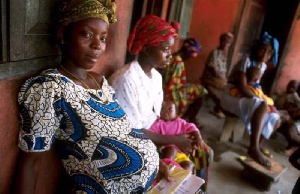A study by SEND-Ghana has revealed that a lot of women who go into labour, especially in the northern regions, avoid health facilities due to illegal fees, a situation that contributes to the rise in maternal mortality.
Under the free maternal health programme, pregnant women are entitled to: exemption from paying NHIS premium; exemption of payment of registration fees; waiving the period between registration and accessing the services; free medical care and medicines during delivery; and free medical services and care for the new-born baby on the mother’s ticket.
However, the study found there are a number of hidden or unapproved charges at the various facilities that prevent poor pregnant women from fully enjoying benefits offered by the policy.
According to the report, pregnant women are compelled to provide a list of items before being admitted to the health facilities for delivery; a situation many cannot afford, thereby forcing them to use the traditional method of delivery which can eventually end in death.
“It’s not all of us who can get the items demanded by the facilities, and when you do not provide them you are mishandled. In fact, this small girl was delivered at home because my husband could not afford the items requested,” a respondent is quoted in the report as saying.
The results show that at some facilities in the four regions targetted by the study,the Upper West, Upper East, Northern and the Greater Accra Regions -- clients are charged between GHC3 and GHC4 for items such as specimen bottles for laboratory tests, and they also pay for for pregnancy test kits.
In Greater Accra, the report noted, facilities charge even higher amounts that range between GH?30 and GH?100 without receipts.
“Clients are often compelled to provide a list of items before being admitted for supervised delivery. This list is displayed at the facility for all pregnant women to provide. A rough estimate of the items runs into hundreds of Ghana cedis,” the report said.
“The disturbing question is how many pregnant women will be able to afford these items considering the level of poverty in the three regions of the north. This is enough to prevent many pregnant women from going to the facility,” Siapha kamara, CEO of SEND-Ghana, said at the report’s launch in Accra.
Some of the items required to be provided by pregnant women before delivery include: two long rubber sheets to spread on the bed; two black rubber buckets to contain their used cloths; a flask containing mashed kenkey or tea; one chamber pot to contain urine and vomit; six old cloths and three strong new ones to wrap the baby, and many more.
Another challenge confronting the pregnant women as depicted in the report is the unavailability of, or inadequate, logistics.
“With regard to availability of ambulances, more than half (55%) of respondents indicated services were poor or nearly unavailable. Nearly one fifth (18%) of health facilities interviewed had good ambulance services, while 27% reported lack of or inadequate ambulance services. The supply and availability of laboratory services, pressure machines, oxygen, microtome, stethoscopes, and radiant heaters follow similar patterns of distribution as discussed above,” the study reveals.
“However, less than a tenth (5%) of respondents, including Tolon Health Centre had woefully inadequate number of beds, machines and tools such as stethoscopes, microtome, etc. Out of the facilities that indicated availability of beds, almost half (47%) indicated they were in poor condition. A third of them said the condition of beds was satisfactory while the remaining 18% stated the beds were in good condition,” the study indicates.
Health News of Monday, 29 February 2016
Source: B&FT Online
Illegal fees killing women in labour
Entertainment












